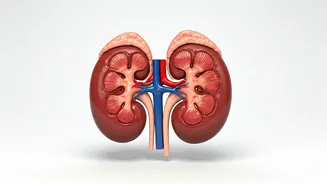Kidneys: Vital Role
The kidneys are indispensable organs, essential for sustaining life. Their primary task is to filter waste products and excess fluids from the blood, which
are then eliminated as urine. Beyond waste removal, kidneys perform several crucial functions. They play a vital part in regulating blood pressure by managing fluid volume. Kidneys also assist in producing red blood cells by secreting a hormone called erythropoietin. Moreover, they help maintain a balanced electrolyte level and activate vitamin D, which is essential for bone health. Healthy kidneys are pivotal for overall health, and their impaired function can lead to various complications. Therefore, protecting kidney health is of paramount importance for everyone, regardless of age or medical history.
Hydration: Keeping Healthy
Maintaining proper hydration is a cornerstone of kidney health. Dehydration can strain the kidneys, reducing their ability to filter waste effectively. It can also elevate the risk of kidney stones. Consuming an adequate amount of water throughout the day is crucial, especially in warmer climates or during physical activity, when fluid loss is higher. The general recommendation is to drink at least eight glasses of water daily. However, the exact amount can vary based on individual needs, activity levels, and overall health status. Urine color is a good indicator of hydration: it should be pale yellow. Dark yellow urine signals dehydration. Incorporating water-rich foods, like fruits and vegetables, can also contribute to fluid intake. Regular and consistent water consumption helps the kidneys work efficiently, reducing the risk of kidney-related problems.
Dietary Choices Matter
Dietary choices significantly impact kidney health. A well-balanced diet low in sodium, processed foods, and excessive protein can help protect the kidneys. High sodium intake can elevate blood pressure, which, in turn, can damage the kidneys over time. Processed foods are frequently laden with sodium and other additives that can put extra strain on the kidneys. Limiting protein intake, especially from animal sources, is also advisable. A diet rich in fruits, vegetables, and whole grains is beneficial. These foods provide essential vitamins, minerals, and antioxidants, which help reduce inflammation and protect against oxidative stress, both of which can harm the kidneys. It's also important to consume foods rich in potassium, as it helps regulate blood pressure. Furthermore, controlling portion sizes and eating regular meals aids in maintaining a healthy weight, indirectly benefiting kidney health.
Blood Pressure Control
Controlling blood pressure is vital for preserving kidney health. High blood pressure (hypertension) is a leading cause of chronic kidney disease. When blood pressure remains consistently high, it can damage the small blood vessels in the kidneys, leading to impaired kidney function. Regularly monitoring blood pressure is essential, especially for individuals with a family history of hypertension or kidney disease. If blood pressure readings are high, it's crucial to consult a healthcare professional. Lifestyle changes, such as adopting a healthy diet, exercising regularly, and reducing sodium intake, can help manage blood pressure. In some cases, medication may be necessary to control blood pressure effectively. Regular check-ups and proactive management of blood pressure are key to preventing kidney damage and maintaining long-term kidney health.
Regular Exercise Benefits
Regular exercise provides numerous benefits, including the maintenance of kidney health. Physical activity helps improve cardiovascular health, which is closely linked to kidney function. Exercise helps regulate blood pressure and blood sugar levels, reducing the risk factors for kidney disease. Consistent exercise can also aid in weight management, which reduces the strain on the kidneys. Aim for at least 30 minutes of moderate-intensity exercise most days of the week. This could include activities like brisk walking, jogging, cycling, or swimming. Incorporating strength training exercises is also beneficial for overall health. It is essential to consult a healthcare professional before starting any new exercise routine, especially if you have pre-existing health conditions. Gradual progression is key, increasing the intensity and duration of workouts over time to avoid injury. Consistent exercise is a vital component of a comprehensive approach to kidney health.
Manage Blood Sugar
Managing blood sugar levels is another critical factor in kidney health. Diabetes, or high blood sugar, is a major cause of kidney disease. Elevated blood sugar levels can damage the blood vessels in the kidneys, leading to diabetic nephropathy. Individuals with diabetes should carefully monitor their blood sugar levels and follow their healthcare provider's recommendations for managing their condition. This typically involves a combination of dietary modifications, regular exercise, and medication as needed. Regular check-ups with a doctor are also important. These check-ups can detect early signs of kidney damage. Early intervention can help slow the progression of kidney disease. It is essential to adhere to a treatment plan and take all medications as prescribed. Additionally, eating a balanced diet, including complex carbohydrates, lean proteins, and healthy fats, can help stabilize blood sugar levels. Proactive management of blood sugar is critical for maintaining kidney health.
Limit Alcohol Intake
Limiting alcohol consumption is crucial for maintaining healthy kidneys. Excessive alcohol intake can directly harm the kidneys and increase blood pressure, exacerbating the risk of kidney disease. The kidneys play a role in filtering alcohol and its byproducts from the blood. Heavy drinking can overwhelm this process. It can also lead to dehydration, which can put additional stress on the kidneys. It's recommended to consume alcohol in moderation, if at all. Moderation is defined as up to one drink per day for women and up to two drinks per day for men. Regularly monitor your alcohol intake and be mindful of any signs of excessive drinking. If you have concerns about your alcohol consumption, consult a healthcare provider. They can provide guidance and resources for managing alcohol intake. By limiting alcohol, you help protect your kidneys and overall health.
Quit Smoking Habits
Smoking is harmful to the kidneys and overall health. Smoking damages blood vessels throughout the body, including those in the kidneys. This damage can reduce blood flow to the kidneys and impair their ability to function effectively. Smoking also increases the risk of high blood pressure and other conditions that can lead to kidney disease. Quitting smoking is one of the best things you can do to protect your kidneys. Numerous resources are available to help smokers quit, including counseling, nicotine replacement therapy, and prescription medications. Seek support from a healthcare professional, who can help you develop a quit plan tailored to your needs. The benefits of quitting smoking are immediate and long-lasting, significantly reducing the risk of kidney disease and other serious health problems. Eliminating smoking from your life significantly improves kidney health and overall well-being.



















